

*ValenzaStephensReadingRemixed. *Bob Stein: on the future of publishing at The Future of Text 2013. *Donalyn Miller and Colby Sharp Talk Book Access During This Pandemic. *Reading Joy in the Time of Coronavirus.
*Read, Wonder, and Learn! Favorite Authors & Illustrators Share Resources for Learning Anywhere – Spring 2020 – Kate Messner. Hello, friends!
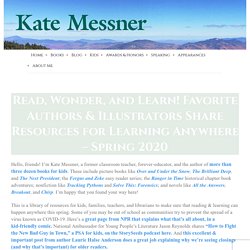
I’m Kate Messner, a former classroom teacher, forever-educator, and the author of more than three dozen books for kids. These include picture books like Over and Under the Snow, The Brilliant Deep, and The Next President; the Fergus and Zeke easy reader series; the Ranger in Time historical chapter book adventures; nonfiction like Tracking Pythons and Solve This: Forensics; and novels like All the Answers, Breakout, and Chirp.
I’m happy that you found your way here! This is a library of resources for kids, families, teachers, and librarians to make sure that reading & learning can happen anywhere this spring. *7 Ways to Get Teens Reading in a Smartphone Culture. One evening last week, I collapsed into bed after homework was finished, lunches were packed, and bedtime stories were read and happened upon an impassioned Los Angeles Times op-ed by high school political science teacher Jeremy Adams.
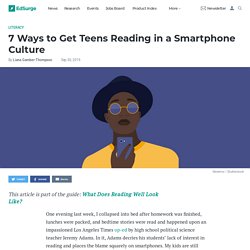
In it, Adams decries his students’ lack of interest in reading and places the blame squarely on smartphones. My kids are still young, but I’m always thinking of how to instill in them a passion for books, so I read on...on my smartphone. A community of readers. The Benefits of Audiobooks with Guest Dr. Rose Brock. Visit with Nick Glass, founder of TeachingBooks.net. Social media could help you read more. Find out how - ABC Life. If you're a reader in 2019, it's quite likely that your relationship to books is defined by guilt. Guilt about not reading enough of them. Guilt about the growing pile of unopened paperbacks on your bedside table. Guilt about spending more time scrolling through photos of complete strangers' breakfasts and beach holidays than you spend consuming the written word.
If that sounds familiar, don't worry, you're not alone. According to a 2017 survey conducted by the Australian Council for the Arts, 68 per cent of Australian readers wished they read more. Kyongwon Koh Radical Change Theory. Biblionasium and Destiny. Katherine sokolowski: What Remains. Yesterday I had a Zoom book call with a group of friends.
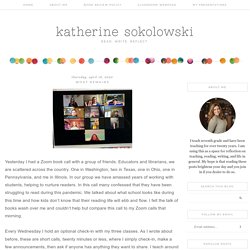
Educators and librarians, we are scattered across the country. One in Washington, two in Texas, one in Ohio, one in Pennsylvania, and me in Illinois. In our group we have amassed years of working with students, helping to nurture readers. In this call many confessed that they have been struggling to read during this pandemic. Marjan Ghara on Engaging Children in Reading Culture and Social Reading. Otis Chandler, Founder & CEO of Goodreads on Growth of Social Reading. Summer Reading 501: Helping Generation App Read This Summer - edWeb. Presented by Michelle Luhtala, Library Department Chair, New Canaan High School, CT; and Jane Lofton, Teacher Librarian Sponsored by Mackin Educational Resources If you attended the live session, you’ll be emailed a CE certificate within 24 hours of the edWebinar.
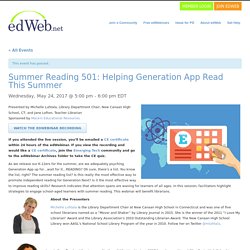
If you view the recording and would like a CE certificate, join the Emerging Tech community and go to the edWebinar Archives folder to take the CE quiz. As we release our K-12ers for the summer, are we adequately psyching Generation App up for…wait for it…READING? Oh sure, there’s a list.
Position Statement on the School Librarian's Role in Reading. Rationale: Reading is a foundational skill for 21st-century learners.
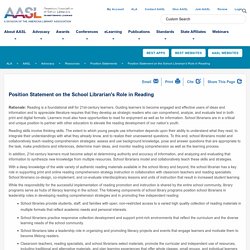
Guiding learners to become engaged and effective users of ideas and information and to appreciate literature requires that they develop as strategic readers who can comprehend, analyze, and evaluate text in both print and digital formats. Learners must also have opportunities to read for enjoyment as well as for information. Position Statement on the Value of Independent Reading in the School Library Program. The following position statement is currently under review to align with the National School Library Standards.
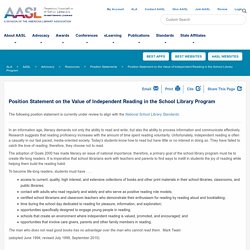
In an information age, literacy demands not only the ability to read and write, but also the ability to process information and communicate effectively. Research suggests that reading proficiency increases with the amount of time spent reading voluntarily. Position Statement on the Role of the School Librarian in Reading Development. Reading development is a process for attaining literacy by integrating oral and written language experiences into the literature and content areas.
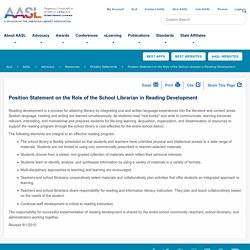
Spoken language, reading and writing are learned simultaneously. As students read "real books" and write to communicate, learning becomes relevant, interesting, and motivational and prepares students for life-long learning. Acquisition, organization, and dissemination of resources to support the reading program through the school library is cost-effective for the entire school district. The following elements are integral to an effective reading program: Donalyn Miller. Educational Leadership:Reading to Learn:Reversing Readicide. GUYS READ. Tales2Go: an audio collection (and a literacy solution) I LOVE audiobooks!
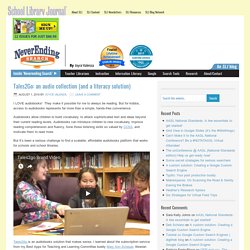
They make it possible for me to always be reading. But for kiddos, access to audiobooks represents far more than a simple, hands-free convenience. Audiobooks allow children to build vocabulary, to attack sophisticated text and ideas beyond their current reading levels, Audiobooks can introduce children to new vocabulary, improve reading comprehension and fluency, hone those listening skills so valued by CCSS, and motivate them to read more.
But it’s been a serious challenge to find a scalable, affordable audiobooks platform that works for schools and school libraries. Teen Librarian Toolbox — @TLT16 Pprofessional development for teen librarians. YA Books and More. Watch. Connect. Read. Center for the Study of Multicultural Children's Literature.